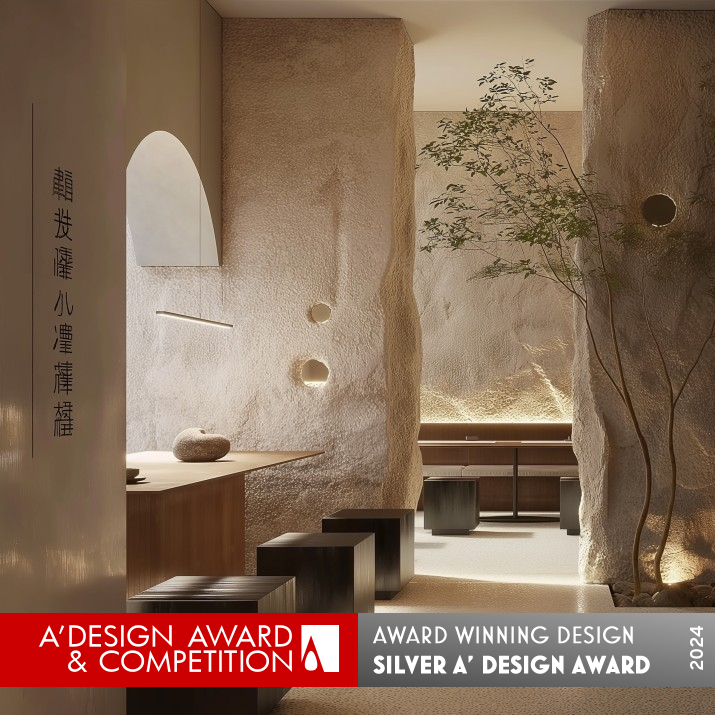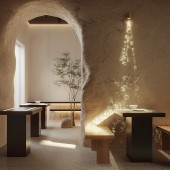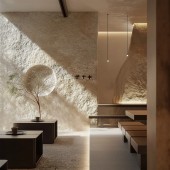

|
|
| DESIGN DETAILS |
DESIGN NAME:
AI Interior Concept
PRIMARY FUNCTION:
Japanese Restaurant Design
INSPIRATION:
For the design project of a Japanese restaurant, it was decided to use AI-generated images at the conceptual stage since the client wanted to see as many variations as possible. The materials and overall mood of the space were planned out initially, as AI needed to be given specific parameters, and it performed excellently in its task. In my opinion, it effectively created the overall ambiance of the premises and developed interesting layout zones.
UNIQUE PROPERTIES / PROJECT DESCRIPTION:
The use of artificial intelligence in interior design offers unique properties that can significantly enrich the design process. With its ability to generate numerous design variations, it helps enrich the decision-making process and expand the boundaries of creative thinking. Furthermore, the use of AI in interior design fosters innovation and experimentation, helping to create unique and impressive spaces that meet modern client requirements and expectations.
OPERATION / FLOW / INTERACTION:
With this wonderful tool, it's possible to quickly generate project concepts and then refine them in specialized programs. In the initial stages, AI can greatly assist with certain decisions. Of course, AI can't design for you, but it can help generate many variations in a short amount of time.
PROJECT DURATION AND LOCATION:
The project was completed in 2023 in Bangkok, Thailand.
|
PRODUCTION / REALIZATION TECHNOLOGY:
First, we needed to define the overall stylistic direction of the restaurant: materials, textures, colors, lighting choices, and brightness. Then, once the general concept was assembled, we needed to set the parameters for Midjorney. After generating the images, I began the selection process. AI creates 4 images to work with: refine a specific image or choose variations based on it. While exploring different options, I selected the ones that were more compositionally interesting and suitable, and proceeded to work with them. By creating chains of images, one can achieve truly good results.
SPECIFICATIONS / TECHNICAL PROPERTIES:
Midjorney was used to work on the concept.
TAGS:
Artificial intelligence, Midjourney, Human-machine collaboration, Interior design, Generative design, Efficient design
RESEARCH ABSTRACT:
Research Background: There is a need to improve the convenience of the interior design process and enhance the efficiency of design and modification.
Methodology: I utilized artificial intelligence for interior design based on the concept we discussed with the client according to their requirements.
Results: With the use of artificial intelligence, designers can quickly obtain conceptual visualizations of interiors, enabling efficient creation and modification of designs.
Conclusions: AI proves to be highly effective when utilized properly. Such versatile design saves time and allows reliance on images generated by neural networks. Increased design efficiency is achieved by eliminating the need for manual modeling and visualization during the concept approval stage.
CHALLENGE:
The difficulty lies in how accurately you can generate a prompt. Sometimes, the neural network doesn't understand what you want from it, and you have to deal with finding the right words. Additionally, these images cannot replace visualization in the traditional sense because you cannot create different frames for one space, they always change.
ADDED DATE:
2024-02-26 13:14:36
TEAM MEMBERS (1) :
Elizaveta Oputina
IMAGE CREDITS:
Elizaveta Oputina
|
| Visit the following page to learn more: https://www.behance.net/gallery/193576163/AI-
Interior-Concep |
|
| COMMENTS |
| Giulia Esposito |
Comment #100322 on June 22, 2024, 3:10 am |
|
The intersection of art and technology finds a remarkable embodiment in the "AI Interior Concept" for a Japanese restaurant, a project that not only showcases an innovative approach to design but also highlights how artificial intelligence can play a pivotal role in enhancing the creative process. The idea to employ AI-generated images at the conceptual stage, in order to present a plethora of design variations to meet the client's needs, was not only ingenious but also highly effective. It allowed for the exploration of numerous design possibilities, thus pushing the boundaries of traditional interior design and opening up new avenues for creative exploration. The methodology of utilizing AI, as detailed in the design process, underscores a significant advancement in how designers can approach and execute their visions, offering a glimpse into the future of design where AI assists in crafting spaces that are both aesthetically pleasing and functionally innovative. The challenges faced during the design process, including the intricacies of generating accurate prompts for the neural network, reveal a meticulous attention to detail and a deep understanding of the tools at hand. This project stands as a testament to the potential of AI in transforming spaces into unique and impressive environments, catering to modern requirements and expectations with unprecedented efficiency and creativity. The exceptional use of AI in this context not only enriches the decision-making process but also demonstrates a forward-thinking approach to interior design, making this achievement truly deserving of recognition. Such a visionary application of technology in design is inspiring, and it is with great admiration that I commend this work by Elizaveta Oputina for its innovation and excellence in the realm of Generative, Algorithmic, Parametric, and AI-Assisted Design.
|
| Chloe Turner |
Comment #100907 on June 22, 2024, 5:07 am |
|
The innovative approach taken in the design project of a Japanese restaurant, utilizing AI-generated images at the conceptual stage, is truly commendable. It is fascinating how the integration of artificial intelligence allowed for an exploration of numerous design variations, catering precisely to the client's wishes. The careful planning of materials and the overall mood of the space, combined with the AI's execution, resulted in a remarkable ambiance and the development of intriguing layout zones. This work stands as a testament to the seamless blend of technology and creativity, pushing the boundaries of traditional interior design. The accomplishment in winning the A' Design Award in the Generative, Algorithmic, Parametric, and AI-Assisted Design category is well-deserved, showcasing a forward-thinking approach to design that is both inspirational and exemplary. The vision and execution behind this project highlight the endless possibilities when innovative tools are applied with expert skill.
|
| Paul Phillips |
Comment #101149 on June 22, 2024, 5:56 am |
|
The winning of the A' Design Award for an "AI Interior Concept" in the category of "Generative, Algorithmic, Parametric and AI-Assisted Design" truly signifies the remarkable integration of artificial intelligence into the realm of interior design, pushing the boundaries of creativity and innovation. The described approach of leveraging AI to generate numerous design variations not only enriches the decision-making process but also expands the horizons of creative thinking in ways previously unimagined. It is inspiring to see how the adoption of AI fosters innovation and experimentation, leading to the creation of unique and impressive spaces that adeptly meet the modern client's requirements and expectations. The dedication to exploring and implementing novel technologies in design, as demonstrated in this Japanese Restaurant Design, showcases a forward-thinking mindset that is sure to inspire future generations of designers. This work stands as a testament to the transformative power of AI in the design world, and it is a pleasure to acknowledge such an innovative contribution to the field.
|
| Elisabeth Clark |
Comment #101741 on June 22, 2024, 7:54 am |
|
The award-winning "AI Interior Concept" for a Japanese restaurant by Elizaveta Oputina is a testament to the innovative fusion of technology and design. It is truly inspiring to see how the use of artificial intelligence has not only enriched the design process but also pushed the boundaries of creativity and functionality in interior design. Elizaveta's approach, which harnesses AI to generate a multitude of design variations, showcases a forward-thinking methodology that significantly benefits the decision-making process. This not only fosters innovation but also ensures the creation of unique and impressive spaces tailored to modern expectations. The meticulous research and methodology behind this project highlight the potential of AI in enhancing the efficiency and convenience of interior design. By leveraging AI for conceptual visualizations, Elizaveta has demonstrated a remarkable ability to efficiently modify and create designs that resonate with the client's vision while maintaining a high standard of aesthetic appeal. This work stands as a brilliant example of how technology can be seamlessly integrated into the creative process, paving the way for future innovations in the field. Elizaveta Oputina's achievement in receiving the A' Design Award for such a pioneering project not only celebrates her exceptional talent but also serves as an inspiration for the design community to explore new horizons in the application of AI in design.
|
| Adam Harris |
Comment #102180 on June 22, 2024, 9:22 am |
|
The innovative approach taken in the "AI Interior Concept" for a Japanese restaurant design truly sets a new standard in the realm of Generative, Algorithmic, Parametric, and AI-Assisted Design. It is genuinely enlightening to see how artificial intelligence can play a pivotal role in the creative process, offering a plethora of design variations that not only enhance decision-making but also push the boundaries of innovation and creativity. The ability to generate unique and impressive spaces that align with contemporary client requirements and expectations demonstrates a forward-thinking methodology that is both inspiring and admirable. The meticulous research and attention to detail in overcoming the challenges of AI-generated prompts further highlight the dedication to excellence. This work's recognition with the A' Design Award is a testament to the potential of AI in transforming the landscape of interior design, making it a commendable example for designers and enthusiasts alike.
|
| Paul Williams |
Comment #102388 on June 22, 2024, 10:04 am |
|
AI Interior Concept is a testament to the incredible potential that artificial intelligence holds in transforming the realm of interior design, and the recognition it has received through the A' Design Award is incredibly well-deserved. The innovative approach to utilizing AI in creating a multitude of design variations not only showcases a pioneering spirit but also a dedication to pushing the boundaries of creative design. The methodology behind the project, focusing on efficient and dynamic creation and modification of space through AI, highlights a forward-thinking approach to interior design challenges. The inspiration drawn from the desire to meet the client's demand for varied concepts has resulted in a captivating and uniquely atmospheric Japanese restaurant design. The challenges faced during the design process, particularly in communication with neural networks, underscore the meticulous attention to detail and perseverance in achieving excellence. This project, through its exploration and application of AI, stands as a beacon of innovation, inspiring both awe and admiration for its contribution to the future of design.
|
| Mark Allen |
Comment #102948 on June 22, 2024, 11:56 am |
|
The remarkable triumph in the A' Design Award for the "AI Interior Concept" in the Japanese Restaurant Design category showcases an innovative blend of technology and creativity. The utilization of artificial intelligence to generate a plethora of design variations not only enhances the decision-making process but also pushes the boundaries of creative thinking. This approach fosters innovation and experimentation, leading to the creation of unique and impressive spaces that adeptly meet modern demands. The meticulous research and the thoughtful integration of AI in the conceptual stage, coupled with the challenge of accurately generating prompts, highlight a forward-thinking methodology. The result is a testament to the effectiveness of AI in transforming the interior design landscape, proving that when technology is harnessed correctly, it can significantly increase efficiency and offer a new realm of design possibilities. Congratulations on this outstanding achievement and for setting a remarkable benchmark in the realm of Generative, Algorithmic, Parametric, and AI-Assisted Design.
|
| Elena Petrenko |
Comment #103176 on June 22, 2024, 12:41 pm |
|
This award-winning "AI Interior Concept" for a Japanese Restaurant brilliantly showcases the transformative power of artificial intelligence in pushing the boundaries of interior design, resulting in a space that is not only innovative but deeply reflective of modern design needs and aesthetics.
|
|
|









